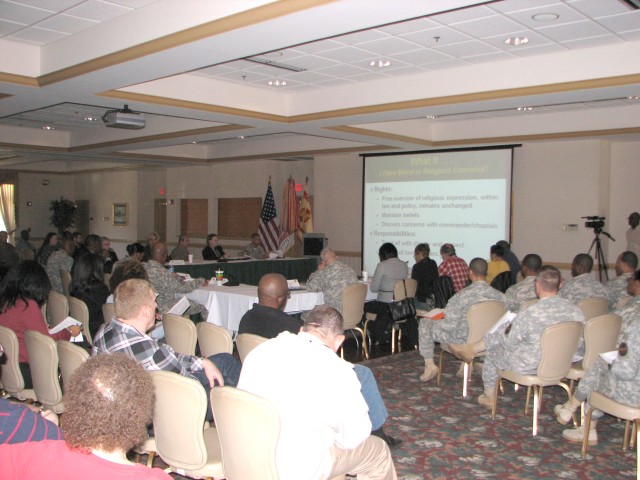
Don't Ask, Don't Tell may be ending soon, but there was asking and telling going on at the repeal of Don't Ask Don't Tell training brief held March 11 at The Commons at Fort McPherson.
The purpose of the training was to inform senior military leaders and high grade Civilian employees about the repeal and the effects it will have on the military and its day-to-day operations.
Attendees, which included senior enlisted Soldiers, unit commanding officers, Civilians grade GS-11 and above and contractors, were able to ask questions on how the repeal would affect them and their subordinates.
Subject matter experts, such as Col. Deborah Grays, U.S. Army Garrison (USAG) commander; Command Sgt. Maj. Karl Roberts, USAG command sergeant major; Chap. (Lt. Col.) Bob Phillips, USAG chaplain; Lt. Col. Dion Lyons, USAG staff judge advocate; among others, were available to tell attendees the answers to their questions and let them know how the policy would affect them.
"The intent of the training is for you to understand how we will implement the change in policy, not to debate its merits," said Gen. George Casey Jr., Army chief of staff, in a video presentation shown at the beginning of the training. Understanding changes is vital, as it allows leaders to effectively support changes, Casey said. "Leader support for this effort must be visible and unequivocal if we are to implement the new policy without interrupting our wartime mission," he said.
The most notable change is Soldiers will no longer be discharged based on their sexual orientation, nor will their sexual orientation be a factor in recruitment and retention, Grays said.
The Army will also prohibit the collection of data on an individual's sexual orientation, except when it is essential to an investigation or other official act. The acceptance of gays in the military, however, will not prevent sexual misconduct from being grounds for administrative or legal action.
The Uniform Code of Military Justice will remain the legal foundation of good order and discipline in the military, and will continue to enforces standards of conduct and laws, prohibits harassment, sexual assault or other violence, and punishes sexual misconduct of all Soldiers, Grays said.
Changes will impact all: military, Civilian employees and contractors. Although DoD Directive 1020.02, Diversity Management and Equal Opportunity, already prohibits unlawful employment discrimination based on sexual orientation among DA Civilian employees, the training is still important for them, Grays said.
Many functions, such as providing Soldiers with housing, taking care of records and implementing day-to-day Army functions, is handled by Civilians, so they will need to know how Army policies will affect incoming gay and bisexual Soldiers, she said. For example, Civilian employees working in Family Advocacy Programs will need to know how to handle domestic disputes between same-sex partners and benefits same-sex partners can get. Staff at Army Community Service and Child, Youth and School Services will also need to become familiar with how the repeal will affect Family- based programs and school enrollment.
While changes are coming, it was noted changes in policy will not occur until 60 days after the president, the secretary of defense and the chairman of the joint chiefs certify the appeal can be implemented consistent with the standard of military readiness and effectiveness, Casey said.
The certification date has yet to be determined, Casey said, adding once the date is chosen, it will be widely publicized. Until then, current policies remain in effect. The training will help smooth the transition when it does finally occur, Grays said. Besides training leaders, Grays said additional training will be provided for remaining Civilian employees and Soldiers.
Although a timetable has yet to be determined, Grays said she hopes to have everyone trained to standard by May. While there are many changes that the repeal of Don't Ask, Don't Tell will bring about, one thing that will not change is the way the Army treats its people, Grays said.
"Soldiers will continue to be evaluated only on their merit, fitness and capability," she said. "The Army will maintain zero tolerance for harassment, violence or discrimination."
Lyons shared similar comments, reiterating people cannot use homosexual conduct as a discriminating factor.
Soldiers, he said, must continue to treat everyone with dignity and respect and follow all lawful orders.

Social Sharing